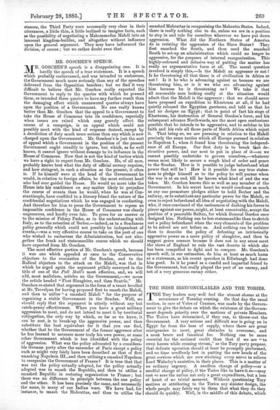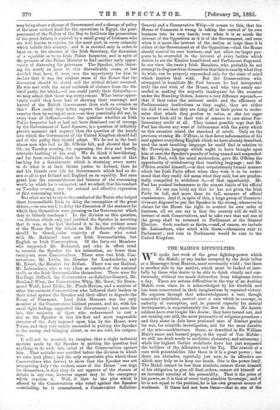THE IRISH IRRECONCILABLES AND THE TORIES. T HE Tory leaders may
well feel the utmost shame at the occurrence of Tuesday evening. On that day the usual motion, in case of Votes of Censure, was made by the Government to give the debate on which the existence of the Government depends priority over the motions of private Members. The Tories have determined, if they can, to throw-out the Government. A very serious and difficult war is going on in Egypt far from the base of supply, where there are great emergencies to meet, great obstacles to overcome, and a most brave and fanatical foe. Nothing can be more essential for the national credit than that if we are "to swop horses while crossing stream," as the Tory party propose, that delicate operation should at least be promptly performed, and no time needlessly lost in putting the new heads of the great services which are now straining every nerve to relieve Lord Wolseley's anxieties, in their places. This is a matter of no ordinary urgency. A needless change of policy—or a needful change of policy, if the Tories like to have it so—may cost or save the nation not only a great expenditure, but a loss of heart of no trivial moment. Without questioning Tory motives or attributing to the Tories any sinister design, the whole people may fairly say to them that what they do they should do quickly. Well, in the middle of this debate, which may bring about a change of Government and a change of policy of the most critical kind for the operations in Egypt, the postponement of the Orders of the Day to facilitate the prosecution of the great debate, is resisted by a small group of Irishmen who are well known to rejoice, for the most part, in every calamity which befalls this country ; and it is resisted only in order to force on, in the absence of the Irish Secretary, the discussion of a squabble as to an Irish Police Inspector, and in spite of the promise of the Prime Minister to find another early opportunity of discussing the grievance. The Speaker, after listening for nearly an pour to this discreditable scene, at last decided that here, if ever, was the opportunity for him to declare that it was the evident sense of the House that the discussion should be closed and the critical debate resumed. He was met with the usual outbreak of violence from the disloyal party, for which,—if one could justify their disloyalty,— we may admit that there was every excuse. What better opportunity could they have had of showing their contempt and hatred of the British Government than such an occasion as this ? How .could they better express their loathing for this country than by saying at once,—as they practically did say, in every tone of deflance,—that the question whether an Irish Police Inspector had or had not been dismissed out of revenge by the Government of Lord Spencer, is a question of infinitely greater moment and urgency than the question of the hands into which the Government of the United Kingdom should fall and of the policy they should adopt. We do not in the least blame men who feel as Mr. O'Brien felt, and showed that he felt, on Tuesday evening, for expressing the deep and hardly utterable loathing of his soul. We do think it bewildering, and far from creditable, that he feels so much more of that loathing for a Government which is straining every nerve to do what it at least thinks justice to Ireland, than he and his friends ever felt for Governments which had no desire at all to put Ireland and England on an equality. But once grant him the reasonableness and fairness of the consuming wrath by which he is animated, and we admit that his conduct on Tuesdayevening was the natural and effective expression of that consuming wrath. But what are we to say to the conduct of the Tories who helped these irreconcilable Irish to delay the resumption of the great debate,—in one word, to delay the discussion of the sentence for which they themselves were pressing on the Government which they so bitterly condemn ? In the division on this question, —a division, which only just justified the Speaker in asserting that it was, as he had declared it to be, the evident sense of the House that the debate on Mr. Redmond's objections should be closed,—the majority of those who voted with Mr. Redmond were not Irish Irreconcilables, but .English or Irish Conservatives. Of the forty-six Members who supported Mr. Redmond, and who in effect tried to censure the Speaker for his intimation, no fewer than twenty-six were Conservatives. There were two Irish Conservatives, Mr. Lewis, the Memberfor Londonderry, and Mr. Ewart, the Member for Belfast. There was one Radical, Mr. Labouchere, who is too often as careless of the national credit as the Irish Irreconcilables themselves. There were Sir Hardinge Giffard, the Conservative ex-Solicitor-General, Mr. Rowland Winn, the Conservative Whip, Mr. Gorst, Sir Drummond Wolff, Lord Elcho, Mr. Finch-Hatton, and a number of other less eminent Conservatives who followed their leaders in their cabal against the Speaker and their effort to degrade the House of Commons. Lord John Manners was the only member of the Conservative Cabinet present, and he, with his usual right feeling, supported the Government ; but none the less, the majority of those who endeavoured to cast a slur on the Speaker in this his first and most responsible exercise of the duty imposed upon him by the House, were Tories, and they very nearly succeeded in putting the Speaker in the wrong, and bringing about, as we are told, his resignation.
It will not be asserted, we imagine, that a slight technical mistake made by the Speaker in putting the question had any thing to do with this cabal of the Conservatives against him. That mistake was rectified before the division to which we refer took place ; and the only respectable plea which those Conservatives who desired to show that the Speaker was not interpreting duly "the evident sense of the House " can urge for themselves, is that they do not approve of the closure of debate in any case, however urgent may be the emergency which requires it. Well, if that be the plea which is offered by the Conservatives who voted against the Speaker —including, be it remembered, a Conservative Solicitor General and a Conservative Whip—it comes to this, that the House of Commons is wrong in taking the control of its own business into its own hands, even when it is as much the interest of the Opposition as it is of the Government, and even when it is more the interest of the nation at large than it is either of the Government or of the Opposition—that the House should control its own business, and not allow its larger purposes to be overruled in the interest of every faction which desires to see the Empire humiliated and Parliament disgraced. In our view, the twenty Irish Members, who probably do not attempt to disguise from themselves that this is exactly what they do wish, can be properly reproached only for the state of mind which inspires that wish. But the Conservatives who attempted to humiliate Mr. Peel because he had interpreted truly the real wish of the House, and who very nearly succeeded in making the majority inadequate for the occasion under the Standing Orders, deserve a very different reproach,— that if theyvalue the national credit and the efficiency of Parliamentary institutions as they ought, they are either too dull to see that they are doing all in their power to undermine that which they profess to value, or else too eager to secure Irish aid in their vote of censure to care about Parliamentary credit at all. They cannot possibly urge that Mr. Peel has shown any want of forbearance with the party which on this occasion raised the standard of revolt. Only on the previous evening Mr. O'Brien, in that fierce inflammation of his soul against everything English which we have already described, used the most insulting language he could End in relation to Mr. Trevelyan, language which ought to have brought upon him at once the Speaker's penalty of being named and suspended. But Mr. Peel, with his usual moderation, gave Mr. O'Brien the opportunity of withdrawing that insulting language ; and Mr. O'Brien availed himself,—in that ostentatiously formal manner which the Irish Party affect when they wish it to be understood that they really did mean what they said, but are prudentially compelled to withdraw it,--of that opportunity. Mr. Peel has pushed forbearance to the utmost limits of his official duty. No one can fairly say that he has not given the Irish Party its full, and more than its fall, measure of official countenance. And if, in spite of this, a large group of Conservatives are disposed to put the Speaker in the wrong, whenever he claims for the House the right to control its own order of business, all we can say is that the country will do well to beware of such Conservatives, and to take care that not one of the group shall be returned to Parliament at the General Election. Such conduct as theirs,—and, of course, we include Mr. Labon.ehere, who acted with them,—threatens ruin. to Parliament ; and ruin to Parliament would be ruin to the United Kingdom.



































 Previous page
Previous page